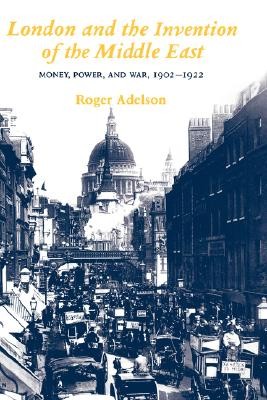| London and the Invention of the Middle East: Money, Power, and War, 1902-1922 Contributor(s): Adelson, Roger (Author) |
|
 |
ISBN: 0300060947 ISBN-13: 9780300060942 Publisher: Yale University Press OUR PRICE: $66.33 Product Type: Hardcover Published: November 1995 Annotation: In the first quarter of the twentieth century, the British Government, the banks, and leading individuals in London reached historic decisions that determined the name, shape and future of the region known as the Middle East. In this innovative and entertaining book Roger Adelson examines who made policy, on what grounds, with what information, and with what results. The setting for the narrative is London, then the world's greatest metropolis and its financial and political centre. In both words and little-known photographs, Adelson evokes the atmosphere of Whitehall, Fleet Street, the City of London, and Westminster, and paints a vivid portrait of the individuals (Balfour, Churchill, Lloyd George, Curzon, Cromer, and others) who defined the political agenda. Using an extensive range of public and private archives, he identifies issues of money, power, and territorial ambition at the heart of policy, and decisions made in ignorance of and often wholly without reference to local interests. |
| Additional Information |
| BISAC Categories: - Political Science | International Relations - General |
| Dewey: 327.410 |
| LCCN: 94036262 |
| Physical Information: 0.85" H x 6.35" W x 9.55" (1.14 lbs) 256 pages |
| Descriptions, Reviews, Etc. |
| Publisher Description: In the first quarter of the twentieth century, the British Government, the banks, and leading individuals in London reached historic decisions that determined the name, shape, nature, and future of the region known as the Middle East. In this fascinating and readable book, Roger Adelson examines who made policy, on what grounds, with what information, and with what results. The setting for the narrative is London, then the world's greatest metropolis and its financial and political center. Adelson evokes the atmosphere of Whitehall, Fleet Street, the City of London, and Westminster, and paints a vivid portrait of the individuals (Churchill, Lloyd George, Curzon, Cromer, and others) who established the international agenda. Using an extensive range of public and private archives, he identifies issues of money, power, and territorial ambition at the heart of policy, and he describes decisions made in ignorance of and often wholly without reference to local interests. The book explores and explains British diplomacy both before and after the 1914-1918 War: the protection of the Suez Canal and Persian Gulf; the fear of a German drive to the East and subjugation of the Turks; the discovery of oil; the post-war suppression of nationalist aspirations and the establishment of collaborative regimes more in tune with London than with the Middle East itself. More clearly than any previous work, it identifies the virtual invention of the modern Middle East and the roots of the ethnic and nationalist antagonisms that characterize the region today. |